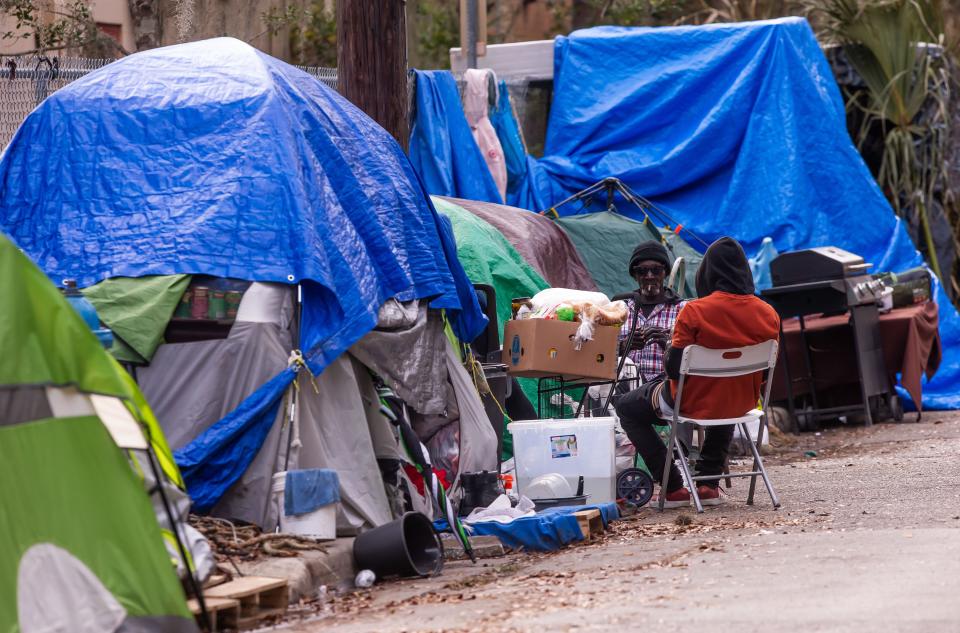New Florida law may force Gainesville to forbid sleeping and camping on public property
- Oops!Something went wrong.Please try again later.
A new Gov. Ron DeSantis-backed Florida law could force Gainesville to forbid people from sleeping on public property.
The anti-public camping bill, heralded by state Republicans and DeSantis, will prohibit municipalities from allowing camping on public property. It will instead force municipalities to provide a designated specific public space for camping along with mental health resources, bathrooms and security.
Proponents of the legislation, including DeSantis, see it as a way to ensure homeless people have the resources needed to “get back on their feet,” while creating cleaner and safer streets. Critics say the law, which goes into effect Oct. 1, unfairly targets and harms a vulnerable population.
“We have decades of evidence that shows that tickets and jails don't do anything to get people off of the street,” said Jon DeCarmine, executive director of Grace Marketplace. “I don't expect this bill to have any positive impact on vulnerable people who are on the streets. To the contrary, it is very likely to make both their lives more difficult and life more difficult for the communities that are now trying to interpret this law in some way.”

More: Alachua County homeless service providers at risk of losing significant funding
More: City commissioners reallocate $700,000 to homeless services, address downtown encampment
In February Gainesville officials largely cleared out a homeless encampment on Southeast Fourth Place, tagging peoples’ belongings with notices that they needed to move from public right-of-ways or their property would be removed by city staff.
At the time, city staff was able to ask people to move from sidewalks and roads, but not other public areas. This new law, however, would have forced them to do so.
In response to concerns over the growing encampment, commissioners also voted to allocate $700,000 to help curb homelessness in the city. The money has gone toward creating 10 new shelter beds at Grace Marketplace, with 10 more being created in the coming months.
“The issue that pops up most often is when people can't or won't come into shelter,” DeCarmine said. “Then we need to start looking at other arrangements like street outreach services, direct housing placements, or any other opportunities to get somebody off the street and into housing.”
Gainesville Mayor Harvey Ward said it is still unclear what exactly this new law will mean for the city. He pointed out that the U.S. Supreme Court has taken up a case from Oregon and will rule on whether a local government can make it illegal to sleep outside when adequate alternative shelter is not available.
Florida’s law, notably, will not ticket unhoused people, but rather the municipalities for allowing them to sleep in undesignated public areas.
“I don't want to make guesses at what the court is likely to do and exactly how that will work with this new law. Like many of the things that we've seen come through the Florida Legislature over the last two years, it's not particularly clear,” Ward said. “It makes some broad assumptions and some broad requirements but leaves a lot up in the air.”
Some points of uncertainty Ward pointed out are the extent to which the county will be involved, and the fact that these designated camping sites will not allow drugs or alcohol despite the prevalence of them among chronically unhoused people with mental health conditions.
He said he hopes to get clarity soon on the questions he finds unanswered in the law.
“I hope to actually speak with the representative who brought it forward because I don't think anybody had ill intent with this, I'm not starting from that position,” Ward said. “I think that they probably just didn't coordinate with first responders who had experience in these areas and with local lawmakers who had experience in these areas, because if they had, they would have written this bill differently.”
This article originally appeared on The Gainesville Sun: City may soon prohibit sleeping on public property due to new law

